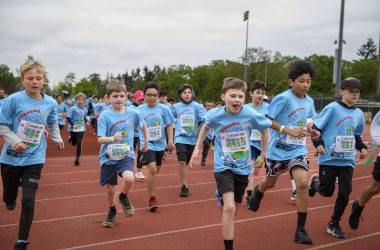When Jon Yoder taught science at North Salem High School, he saw how a little time outdoors could transform a student.
Yoder got his students involved in projects, heading to natural areas around Salem to measure trees or study crayfish to aid state agencies in gathering data. It was important to him they worked on real projects, to emerge with a sense that they were citizens contributing to their community.
“Some of these kids, that was their only time during the day or the only time in school where they felt they were in charge of their learning,” he said.
Now retired, Yoder wants to bring that sense of belonging outdoors to a younger generation of Salemites.
Working alongside Salem Cloth Project, Yoder is starting Nature Play, a monthly guided outdoor play session for kids ages 2-5 held at local parks where they’ll learn to to explore the natural world around them.
A session starting in October with monthly classes at Englewood Park is full. A winter session will begin in January at Claggett Creek Park. Sessions are free with a suggested $5 donation, and families can register online starting a month before the session begins.
It’s part of Salem Environmental Education, an all-volunteer nonprofit he founded to give kids more opportunities to experience the outdoors and learn.
Yoder said the group had been getting regular questions about putting on a program for younger kids.
“After about a year of getting inquiries, it seemed like there was enough energy out there wanting that, that we could provide a program,” he said.
Sessions are limited to 15 kids, and a parent or guardian will need to attend and participate. Instructors will leave families with activities to do between classes and ideas for playing outside.
Yoder said the opportunity to play in nature from a young age has eroded in recent decades, as kids spend more time on screens and families often aren’t comfortable with letting children roam outside or don’t know where to start.
“I grew up in the woods, climbing trees. That was my favorite hobby,” he said of his childhood just outside Salem. “Parents didn’t know where we were. We were just outside somewhere. And when it got dark, we came back for dinner.”
Direct contact with nature has clear benefits for people of all ages in both physical and mental health, reducing stress and increasing physical activity. Yoder and other environmental education advocates say it’s also the first step in developing a sense of the importance of the natural world.
“You start with awareness because without awareness, you can’t care. How can you care about endangered species? How can you care about water quality? How can you care about those things if you don’t know anything about them?” he said.
Teaching at North, Yoder saw firsthand the many reasons today’s kids don’t often get the same experiences outdoors. Families are busy, often working multiple jobs, which means students’ worlds are limited to places they can easily walk or get to from their homes.
Parents who aren’t comfortable in outdoor places are less likely to take their kids there.
He saw how being outdoors gave students a chance to take on different roles. High-achieving students who excelled in the classroom sometimes struggled with hands-on tools and relied on help from their peers who struggled more behind a desk.
“It was great to see those dynamics of kids that would never hang out socially together, but work together as a team because they needed each other. They had different skills,” Yoder said.
Some communities have developed parks intended to encourage outdoor play. At Westmoreland Park in Portland, kids can play in a sandy area with a stream running through it or climb on rocks and logs.
Salem doesn’t have anything equivalent, Yoder said, generally preferring play structures for kids which don’t allow as much open-ended play.
“How much creativity happens when you get on a slide? I guess there’s some kinesthetic things, but you’re not really playing much,” he said.
And while kids could pick up pinecones or build forts at any forested park, Yoder said making places explicitly designed for nature play is important in an environment where many families won’t otherwise think to encourage their kids to interface with nature.
“People just when they walk by, they don’t think of a pine cone as a plaything. If you haven’t experienced that you don’t look at it in that way,” he said.
Contact reporter Rachel Alexander: [email protected] or 503-575-1241.
SUPPORT OUR WORK – We depend on subscribers for resources to report on Salem with care and depth, fairness and accuracy. Subscribe today to get our daily newsletters and more. Click I want to subscribe!

Rachel Alexander is Salem Reporter’s managing editor. She joined Salem Reporter when it was founded in 2018 and covers city news, education, nonprofits and a little bit of everything else. She’s been a journalist in Oregon and Washington for a decade. Outside of work, she’s a skater and board member with Salem’s Cherry City Roller Derby and can often be found with her nose buried in a book.









